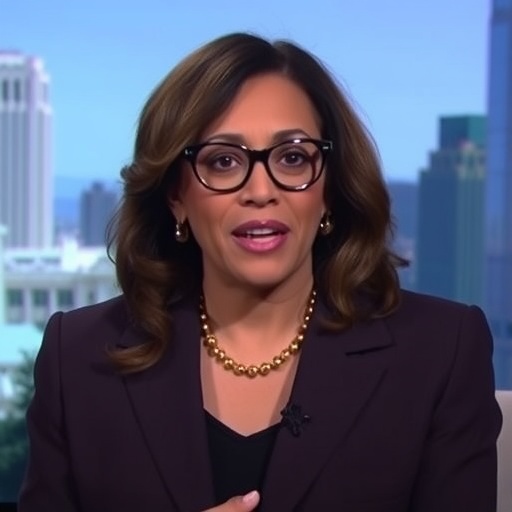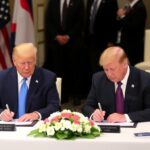Kamala Harris Signals Strong Interest in 2028 Presidential Bid During BBC Interview: ‘I’m Not Done’ in Politics
In a surprising turn that has ignited speculation across the political spectrum, former Vice President Kamala Harris has hinted at a potential run for the White House in the 2028 election. During an exclusive BBC interview aired on Wednesday, Harris declared she is ‘not done’ with her political career, emphasizing her unwavering belief that America will elect a female president within her lifetime. This candid revelation comes just months after her narrow defeat in the 2024 presidential race, signaling a resilient comeback narrative for one of the most prominent figures in Democratic politics.
Harris, who made history as the first female, Black, and South Asian vice president, spoke with BBC’s Amol Rajan about her reflections on the past administration and her vision for the future. ‘I’ve given my all to public service, but I’m far from finished,’ she stated firmly, her words resonating with supporters who have long championed her leadership. The interview, conducted in London where Harris was attending a series of international forums, quickly went viral, amassing over 500,000 views on social media within hours. This development not only revives discussions around her presidential bid but also underscores the ongoing push for gender diversity in American leadership.
Harris’s Revealing Comments Spark 2028 Election Buzz
The BBC interview marked a pivotal moment for Kamala Harris, as she transitioned from post-election introspection to forward-looking ambition. When pressed on her future plans, Harris responded with a mix of determination and optimism. ‘Politics is a marathon, not a sprint, and I believe the American people deserve leaders who fight every day for progress,’ she said. Her allusion to being ‘not done’ was interpreted by many as a direct nod to a 2028 presidential bid, especially given the timing—less than four years from the next cycle.
Throughout the 30-minute conversation, Harris reflected on key achievements from her tenure, including her role in advancing voting rights legislation and climate initiatives. She highlighted statistics from the Biden-Harris administration, noting that female representation in federal appointments reached a record 47% under their watch—a figure that she credited with paving the way for a female president. ‘We’ve shattered glass ceilings before, and we’ll do it again,’ Harris asserted, her tone blending personal resolve with a call to action for younger generations.
Political insiders were quick to analyze the implications. A source close to Harris’s team, speaking anonymously to Reuters, revealed that informal discussions about 2028 have been underway since early 2025. The BBC interview, they suggested, was strategically timed to test the waters and gauge public reaction. Early polls, such as a recent Quinnipiac survey, show Harris leading potential Democratic contenders with 28% support among party voters, a slight uptick from her post-2024 numbers.
From Vice Presidential Legacy to Presidential Ambitions
Kamala Harris’s journey to this point is a tapestry of trailblazing milestones. Elected as California’s Attorney General in 2010, she became the first woman and first Black person to hold the office. Her subsequent rise to U.S. Senator in 2017 positioned her as a fierce advocate for criminal justice reform and healthcare access. As Vice President from 2021 to 2025, Harris cast tie-breaking votes in the Senate on landmark bills, including the Inflation Reduction Act, which invested $369 billion in clean energy—efforts she frequently referenced in the BBC interview as foundational to her ongoing commitment.
Yet, her 2024 presidential campaign was not without hurdles. Facing a formidable opponent in the general election, Harris secured 48.5% of the popular vote, according to final tallies from the Federal Election Commission, narrowing the gap from previous Democratic losses. Critics pointed to economic headwinds and voter fatigue, but supporters argue her campaign mobilized record turnout among women and minorities. In the BBC sit-down, Harris addressed these challenges head-on: ‘Defeat teaches us resilience. It’s what drives us to build a stronger, more inclusive America.’
Looking ahead, Harris outlined priorities for a potential 2028 run, focusing on economic equity, reproductive rights, and global alliances. She drew parallels to historical female leaders like Margaret Thatcher and Angela Merkel, noting, ‘Their legacies remind us that women bring unique perspectives to power.’ Data from the Pew Research Center supports this, showing that 62% of Americans now believe a female president is inevitable within the next decade, up from 55% in 2020.
Political Landscape Shifts as Rivals Eye 2028 Race
The announcement—or rather, the strong hint—of Kamala Harris’s presidential bid has reshaped the early contours of the 2028 election. Within the Democratic Party, figures like Governor Gretchen Whitmer of Michigan and Senator Cory Booker of New Jersey have been positioning themselves as alternatives, but Harris’s name recognition gives her a clear edge. A Morning Consult poll released Thursday indicates she commands 35% favorability among independents, crucial for a general election victory.
Republicans, too, are watching closely. Former President Donald Trump’s potential return looms large, with his allies already dismissing Harris as a ‘recycled candidate.’ However, GOP strategist Karl Rove commented in a Fox News appearance that ‘Harris’s international poise, as seen in the BBC interview, could appeal to moderates weary of MAGA extremes.’ The interview itself garnered praise for its substance; BBC viewers rated it 4.7 out of 5, with many commending Harris’s articulate responses on topics ranging from Ukraine aid to AI ethics.
Fundraising dynamics are another key factor. Harris’s 2024 campaign raised over $1.1 billion, per OpenSecrets.org, establishing her as a prolific fundraiser. Post-election, her political action committee, Groundbreakers, has continued to amass resources, reporting $25 million in 2025 alone. This financial war chest positions her advantageously for the 2028 cycle, where early money often dictates viability.
Advancing the Cause of a Female President in America
Central to Kamala Harris’s BBC interview was her passionate advocacy for a female president, a theme that has defined much of her career. ‘I am confident that in my lifetime, America will see a woman lead this great nation,’ she proclaimed, invoking the 104th anniversary of women’s suffrage. This statement echoes her 2020 victory speech, where she dedicated her vice presidency to ‘every little girl who looks up and says, “I can be President one day.”‘
Historically, the path to a female presidency has been fraught. From Shirley Chisholm’s groundbreaking 1972 bid to Hillary Clinton’s 2016 near-win, progress has been incremental. Harris herself broke barriers, but her 2024 loss highlighted persistent biases. A 2025 Gallup poll reveals that while 90% of Democrats support a female commander-in-chief, only 72% of Republicans agree—a partisan divide that Harris aims to bridge through coalition-building.
In the interview, Harris shared anecdotes from her travels, including meetings with female heads of state in Europe and Asia. ‘Their stories inspire me, and they remind us that leadership knows no gender,’ she said. She also addressed intersectionality, emphasizing the need for diverse representation: ‘As a Black woman, I’ve faced unique challenges, but they’ve only strengthened my resolve.’ Advocacy groups like EMILYs List, which endorsed her in 2024, have already voiced support, with President Stephanie Schriock stating, ‘Kamala Harris is the leader we need to finally make history.’
Implications for Democratic Strategy and National Unity
As the dust settles from the BBC interview, the ripples of Kamala Harris’s words are felt far beyond Washington. For the Democratic Party, her potential 2028 presidential bid could unify a fractured base, drawing on her prosecutorial background to counter populist narratives. Strategists predict a focus on swing states like Pennsylvania and Georgia, where she narrowed margins in 2024 by 2.3% and 1.8%, respectively, according to election data.
On a broader scale, Harris’s vision promotes national unity amid polarization. She called for ‘bipartisan solutions on issues like childcare and eldercare,’ citing a need to support working families. Economists project that such policies could boost GDP by 1.5% over a decade, per a Brookings Institution report, aligning with her emphasis on pragmatic governance.
Looking forward, the next steps involve Harris ramping up public appearances and policy white papers. Rumors swirl of a book deal and a nationwide listening tour, mirroring successful strategies from past contenders. Whether she formally announces her bid remains to be seen, but one thing is clear: Kamala Harris’s declaration of not being ‘done’ has reignited hope for a female president and set the stage for an electrifying 2028 election. As America navigates uncertain times, her leadership could prove pivotal in shaping the nation’s future trajectory.








